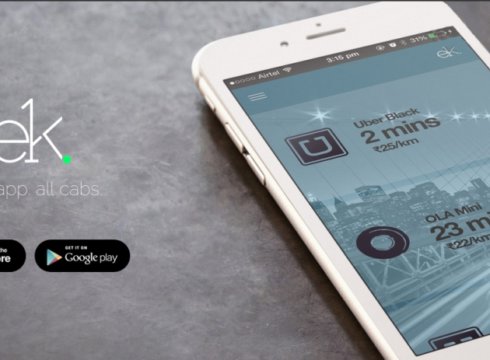Inc42 Daily Brief
Stay Ahead With Daily News & Analysis on India’s Tech & Startup Economy
The Indian radio taxi market is currently valued at $6-$9 Bn and it’s a well known fact that taxi services have disrupted the intra-city transport system and have emerged as one of the best option for people to move. Not only it has proven high on the utilitarian front, but also has helped travelers save money as compared to actual ownership of a personal vehicle.
At a time when most startups are trying to follow the Uber for X mode of business, Mayank Gureja’s EK is trying to unite these services instead. The app went live in India and in beta in The USA and UK, in July this year and is available on both Android and iOS platforms.
The purpose behind EK seemed to be the fact that on-demand economy is inducing a paradigm shift in the market and this represents the beating heart of cities and economy. The new services are not only revolutionising the world but they are also flourishing a new world of digitisation.
It brings in cab services such as Uber, Ola, TaxiForSure and Meru on the same platform and let user compare the services and choose the most reasonable one without leaving the application. It seems that EK is currently not focusing on generating revenues as they want to win user trust by offering a transparent search result helping them choose the best option. Mayank assured users and said that at any juncture, users will get the best option and not the best option someone paid for.
“Since sustainability of cab hailing service will be the backbone of EK, we had a rather optimistic approach towards the Ola/Uber model and since we follow surge pricing we will end up creating an economy of scale,” said Mayank.
Here is a video to know more about Ek
Current Traction, Market Opportunity and Plans Ahead
There are around 10 worldwide cab services on board which includes Sidecar, Hailo, TaxiBeat, Bi Taxi and more. As mentioned on the site, the team is also planning to bring in more services such as Easy Taxi, Curb, 99Taxis, etc. The team claims to get 6X M-o-M new user growth along with 67% re-engagement. There are plans to add other features such as universal ride later option, smart watch app, international expansion to countries such as Brazil, China, etc.
If we go by numbers, than on a per day basis, Uber gets approximately 1 Mn rides, Ola gets 200K rides while Lyft gets 80K rides. Ek attempts to capitalize on the fact that even now the Indian transport space is held together loosely and eventually biggies like Ola and Uber will emerge as winners, but down in the future things are set to change. With government policies making it easier for new players to enter the market, it is more of setting up a fairplay platform for all the players that will eventually result in the best player winning the game and inadvertently avoids monopoly.
When asked about the prospects of Indian cab hailing industry in the upcoming years, Mayank said that they foresee the unorganised sector becoming networked into a loose conglomeration of on-demand applications. “Most of these companies will end up with Uber or Ola, but there is definitely room within the market for an independent on-demand infrastructure provider to bring these cabs online,” he added.
Competition and Challenges
Intracity transport in India has been changing, thanks to the spike in the population and number of vehicles. Defining it in terms of infrastructure design, Mayank said that traffic expands to fill the roads designed to accommodate it. There is a correlation between building larger highways, roads, and flyovers and the amount of car ownership. This creates a destructive cycle which cities can never win – leading to congestion and an unsustainable amount of investment within bigger and bigger infrastructure. Enrique Penalosa, the mayor of Bogota, Columbia, had an eloquent way to say this, “A developed country is not a place where the poor have cars, it’s where the rich use public transportation.”
Ek is not the only cab aggregator out their, Scoot is another such app which promises to bring all the cab hailing services in a single app. In April this year, Ixigo also came up with similar app, covering all major cab providers in 100+ cities. Launched for Android first, it has got over 20,000 downloads from 80+ cities already.
EK needs to constantly evolve and make sure that it is always neutral when it comes to suggestion of cab operators. In all likelihood, Ek might hit a bottleneck with Cab operators like Uber who are usually wary of such attempts as it can divert the business to competitors. At the same time, the app may face a huge setback in case the operators restrict access to their APIs thus destroying the core of the business.
Editors Take
We instantly liked the app since we don’t have to shuffle between a handful of Cab hailing apps to find out the perfect ride for me. Once EK comes up with add on features like scheduled cab hailing services it will add to the unique proposition of the App and make it an indispensable tool. The best part of the application is that it will ensure a level playing ground for any new entrants and this will immensely help new cab hailing businesses. Its equally good to see that EK is taking a Global stance at the transport problem and is not restricting itself to the Indian context. However, with the space getting crowded, price wars have begun and has resulted into more promotional features and technology updates. It would be worth watching how the startups in this space tackle so much of heat.
Note: We at Inc42 take our ethics very seriously. More information about it can be found here.


